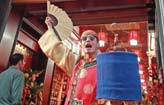Crying wolf about protectionism
Updated: 2011-07-01 10:32
By Andrew Moody (China Daily European Weekly)
US has the worst record in trade wars, says South Korean economist
|
 Economist Ha-joon Chang says China has been unfairly pilloried for trying to protect some of its key industries from foreign competition. [Nick J B Moore / for China Daily]
|
Ha-joon Chang, the influential economist and best-selling author, says the United States is guilty of hypocrisy in accusing China of being protectionist.
The South Korean insists the US was one of the most anti-free trade countries in history when it was a developing economy in the late 19th century.
For the three decades up to around 1880, it had an average industrial tariff rate of between 40 and 55 percent, Chang says.
"It is quite amazing that America now lectures everyone on free trade. From about 1830 to the outbreak of World War II, the US was basically the most protected economy in the world," he says.
Chang, who gives out a chuckle when he thinks he has made an effective point, was taking a break for afternoon refreshment in the River Restaurant at the Savoy Hotel in London.
He thinks China in particular has been unfairly pilloried for trying to protect some of its key industries from foreign competition.
He believes some of the measures the Chinese government has taken since reform and opening-up began in the late 1970s have been the right ones.
"In the end this kind of policy is necessary. Unless you make foreign companies transfer some of their technology, they just come in, use your cheap labor and go out again," he says.
Chang, 47, a reader in the political economy of development at the University of Cambridge, has lived in the UK since he did his masters there in the mid-1980s.
But that has not stopped him becoming something of a minor celebrity in his native South Korea.
His second book Bad Samaritans: The Myth of Free Trade and the Secret History of Capitalism, published in 2008, went right to the top of the best-seller charts there with staggering sales of 500,000 copies for a book of its kind.
Its success was partly boosted by the country's Ministry of Defense deeming some of its contents sensitive and banning its sale in military barracks.
"It was the best publicity I could have had because you could buy it everywhere apart from the army bookshops," he says.
"It sold 250,000 copies within two months of its publication and went to the top of the national best-seller lists not just for economics but all books. It has become a bit of a phenomenon in South Korea."
His latest book, 23 Things They Don't Tell You About Capitalism, is again written in his trademark light, witty yet penetrating style that his readers have become familiar with.
"I put in a lot of effort to make my writing fun and readable. I rewrite some chapters many times to make them more so. I believe not just me but my fellow academics should make more of an effort to speak to the general public," he says.
"Unfortunately, many of my colleagues have this attitude that they are plebs and don't know anything."
Chang challenges the position taken by the G20 leading nations in the aftermath of the financial crisis in 2008 that to adopt protectionist measures in response would ensure a slump on a par with the Great Depression of the 1930s.
He rejects the established view of many economists that protectionist measures implemented nearly 80 years ago made the downturn deeper and more prolonged.
"We were told after the recent financial crisis that we should refrain from protectionism because these are the policies that prevailed after the Great Depression.
E-paper

Franchise heat
Foreign companies see huge opportunities for business
Preview of the coming issue
Stitched up for success
The king's speech
Specials

90th anniversary of the CPC
The Party has been leading the country and people to prosperity.

Premier Wen's European Visit
Premier Wen visits Hungary, Britain and Germany June 24-28.

My China story
Foreign readers are invited to share your China stories.
